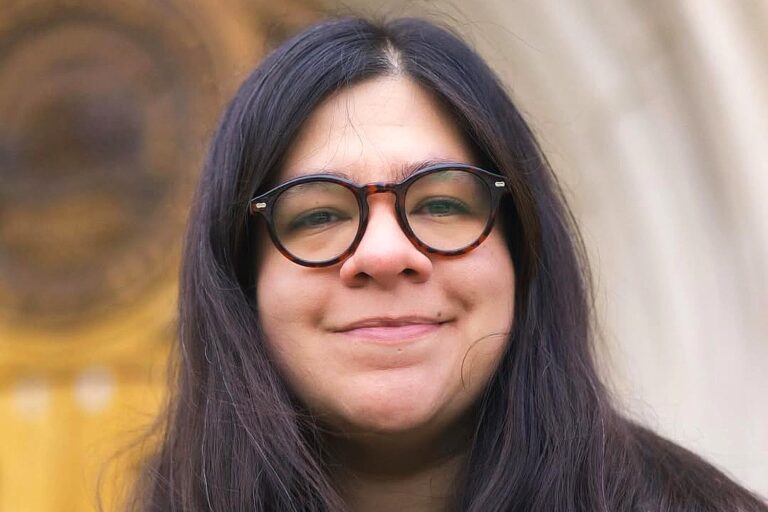Evamelo (Eva) Oleita came to Michigan State University wanting to pursue a degree in Human Biology, but after re-evaluating her priorities and thinking about the communities she wanted to serve, she is now among the inaugural class of students majoring in African American and African Studies (AAAS) at MSU. Oleita, who is in her second year of her undergraduate education, also is majoring in Sociology and Interdisciplinary Studies with a minor in Race and Ethnicity.
“I realized I was only doing STEM because of wanting to please my parents,” Oleita said. “I took some time to truly analyze what I wanted to do in my life and which communities I wanted to serve. I realized that I loved how people interact with each other, and I am passionate about the intersectionality of oppression and how that can affect people’s lives.”

The Bachelor of Arts degree in African American and African Studies, which launched earlier this year, allows students to engage with and appreciate the complexities of Blackness in America by exploring the “particularities of Blackness as it is lived, imagined, and created.” Several components influence the curriculum, including required interconnected classes examining Black Feminisms, Black Genders, and Black Sexualities Studies, where students are exposed to the lives, works, and worlds of Black peoples placing a strong emphasis on the ability to evoke societal change.
“Being a part of AAAS is truly me living my freedom dream and never in a million years would I have imagined being in such an intentionally curated space that truly supports and highlights all the things that I wanted in a school and was afraid I would never get while at MSU,” Oleita said. “I can never truly put into words how being a part of AAAS has changed the trajectory of my life for the better.”
Two of Oleita’s AAAS classes, Black Feminisms and Black Studies, taught by Dr. Chamara Kwakye, encourage students to communicate with faculty regarding their education openly.
“It feels like we are learning intentionally and with a say in our education. Being in AAAS is truly a breath of fresh air, and I am happy that I no longer have to fight just to belong.”
“When I entered that space, I felt so welcomed and comfortable, two things I have been searching for since I arrived on campus,” Oleita said. “It feels like we are learning intentionally and with a say in our education. Being in AAAS is truly a breath of fresh air, and I am happy that I no longer have to fight just to belong.”
Three concentrations characterize the AAAS program: Communities in Action; Creative Expression, Culture, and Performance; and Black Institutions, Sustainability, and Statecraft, which seek to encourage diverse understandings regarding the production of knowledge with and about Black peoples.
Concentrating in Communities in Action, Oleita has always been active in spaces and organizations focusing on building Black community. As a student at Cass Technical High School in Detroit, she was involved in Detroit Area Youth Uniting Michigan (DAYUM), which seeks to provide marginalized youth a “seat at the table” during critical discussions regarding decision-making in their communities.

Oleita also started an organization, “Black Lives Matter in All Capacities,” through which she is working a semester-long campaign focusing on Black girlhood and identity while creating a wellness camp for middle school-aged Black girls.
“I am a big believer in community and building and supporting each other,” she said. “Communities in action has a focus on Black girlhood as well, and I hold Black women and girls in community. A lot of my organizing and advocacy has been done around Black girlhood, and as a Black girl myself, I understand how important it is to understand the complexities of our girlhood.”
On campus, Oleita is the Public Relations Chair for the W.E.B Du Bois Society, a member of the Young Communist League (YCL), and part of the Social Science Scholars program — all programs she picked because of their proximity to the Black community on campus.
“Being one of the first students to have this major makes me feel like coming to MSU was not a mistake but that I am supposed to be here.”
“It was difficult in my first year to find my community on campus because of the limited Black students and the lack of radical Black spaces,” she said. “I joined all these organizations because they relate or assist me with my demand for liberation.”
After initially aiming to attend a Historically Black College or University (HBCU), Oleita decided to attend Michigan State University for the financial security it provided after receiving a Detroit Promise Scholarship in addition to another scholarship from the University.
Despite ultimately having to make a utilitarian decision regarding attending Michigan State, being a part of an inaugural program allows students to play an active role in their education. It provides a pathway for students to communicate with professors about the curriculum and the subsequent campus community it creates.
“It is amazing to be in this space and be able to set the stage for more Black students to feel welcomed. I know that even if Black students do not want to pursue AAAS as a major or a minor, they can still know there is a space on campus where they will feel welcomed and at home,” Oleita said. “Being one of the first students to have this major makes me feel like coming to MSU was not a mistake but that I am supposed to be here.”


